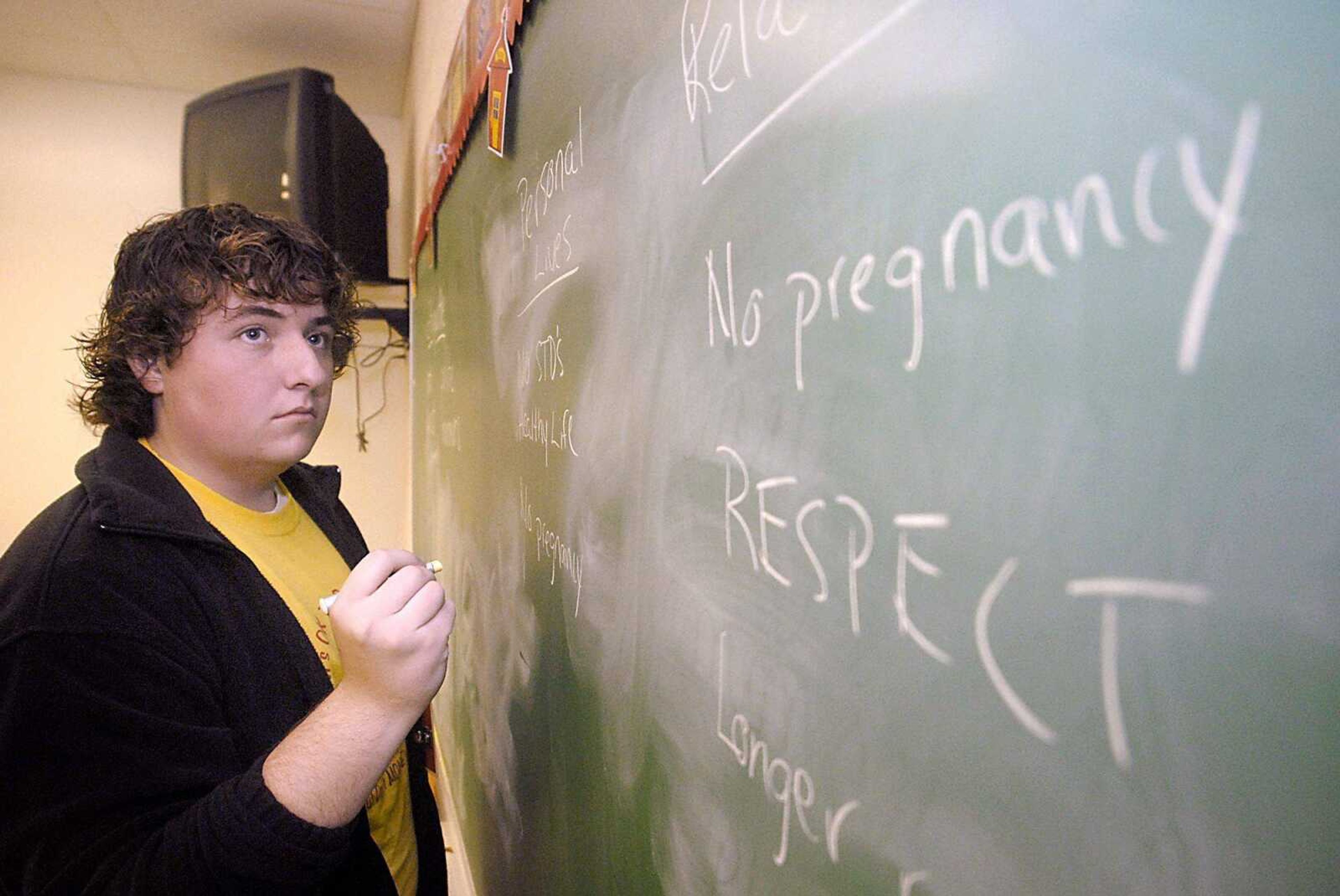High school students teach abstinence class
At 8:30 a.m. on a Wednesday, it's early to be talking about sex. At the mention of the word, eighth-graders hide smiles, steal glances at one another or shift awkwardly in their seats. For some students, it's their first formal education about sex...
At 8:30 a.m. on a Wednesday, it's early to be talking about sex. At the mention of the word, eighth-graders hide smiles, steal glances at one another or shift awkwardly in their seats.
For some students, it's their first formal education about sex.
Trained high school students entered junior high classrooms last week to help their peers "look at teen sexual involvement in a critical way." The five-session class is called "Postponing Sexual involvement," or PSI, and is sponsored by the University of Missouri Extension and the Cape Girardeau County Health Department. Leaders discuss abstinence only.
Jackson, Nell Holcomb, Oak Ridge, Notre Dame and Cape Gir?ardeau districts participate, although some districts choose to begin the program in the spring.
"We have to remind students that they cannot handle the responsibility of having sex and make them realize they don't have any right to have sex," said Mary Gosche, who helps run the program. She has trained about 100 teens in three counties.

Wearing a shirt saying "It's OK to be curious," senior Heather Hileman talked to a group of Nell Holcomb junior high students with PSI partner Seth Gregory.
When Hileman asked how many students had enough information about sex, no one raised their hand. One student suggested the Internet as a source of information.
The leaders weren't surprised by the lack of information; many local schools, especially at the junior high level, actively avoid sex education and refuse to discuss contraception.
The state's GLEs, or Grade Level Expectations, spell out what should be taught at what grade. In seventh grade, the state says students should be able to describe how to protect themselves from sexually transmitted diseases and be able to "explain the role of abstinence for prevention."
In parenthesis, a section of the Revised Statutes of Missouri is included. It requires that students be presented with the latest medically factual information "regarding both the possible side effects and health benefits of all forms of contraception."
However, an asterisk indicates that district curriculum policy should be followed when discussing methods of contraception. This gives districts a great amount of latitude.
Schools get away with not discussing the issue at all because "that's a real hard thing to monitor," according to Steve Williams, a health consultant for the state's department of education.
Middle school and junior high health teachers in both Cape Girardeau and Jackson said they don't broach the issue themselves. Any form of sex education is left to the PSI classes.
"We haven't covered that, and we don't talk about it," said Tatum Kitchen, a health teacher at Jackson Middle School, which serves students in grades six and seven.
That's a huge difference from a Portland, Maine, middle school that grabbed national attention this week when it decided to allow children as young as 11 -- after extensive counseling -- to obtain birth control pills at the middle school health center. The three middle schools in Portland had seven pregnancies in the last five years.
In Jackson, health class is a requirement for seventh-grade students, but it is only a quarter-long class. Kitchen said time limits the material that can be taught. Students receive information about sexual health in ninth-grade health, he said, where health recently became a semester-long class required for graduation.
Jackson Junior High principal Cory Crosnoe said ninth-grade students learn about the reproductive system but "don't get into birth control or anything like that. That is something our curriculum wouldn't allow here."
Deborah Spinner, a physical education and health teacher at Central Junior High School in Cape Girardeau, said she wishes the PSI classes were longer. "I don't think they get enough of the education. They learn, and then it's over. It goes so quickly. I wish they got more information," she said.
In Cape Girardeau County in 2005, there were 30.7 teen births per 1,000 people, compared to 32.5 per 1,000 statewide. According to the 2007 Community Health Data Analysis, the number increased in Cape Girardeau County from 1999 to 2003, while the Missouri rate continued to decrease.
Katie Bowles, a student at Central High School, said abstinence was stressed but methods of contraception were discussed when she took high school health. She realizes there are negatives to both forms of sex education.
"If you know [methods of contraception], you can feel more secure to have sex, which could be a bad thing. But if you don't know, you can't prevent STDs or pregnancy," she said.
Jake Kimball, a senior at Central, said he doesn't think messages about sex get through to teenagers. "Just abstinence isn't going to do anything because everyone wants to have sex. It just goes in one ear and out the other," he said.
A recent study found that students receiving federal abstinence education were not more likely to abstain from sex.
The results come from a federal study for the U.S. Department of Health and Human Services begun in 1999 that followed students for four to six years after receiving sex education. In four locations, two urban and two rural, youths were divided into a control group that received services normally provided by their school and a group that received abstinence education sponsored by the government.
"Those who reported having sex had similar numbers of sexual partners and had initiated sex at the same mean age," the study said. However, "contrary to concerns raised by critics of abstinence education, program group youth were no more likely to have engaged in unprotected sex than control group youth."
Many local educators said their felt that if contraception was discussed, they would be condoning sexual acts. "Kids are much more curious at an earlier age. We need to talk to them about making some right choices," Crosnoe said.
lbavolek@semissourian.com
335-6611, extension 123
Connect with the Southeast Missourian Newsroom:
For corrections to this story or other insights for the editor, click here. To submit a letter to the editor, click here. To learn about the Southeast Missourian’s AI Policy, click here.










